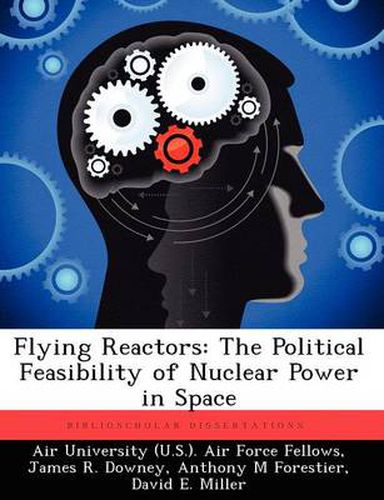Readings Newsletter
Become a Readings Member to make your shopping experience even easier.
Sign in or sign up for free!
You’re not far away from qualifying for FREE standard shipping within Australia
You’ve qualified for FREE standard shipping within Australia
The cart is loading…






This title is printed to order. This book may have been self-published. If so, we cannot guarantee the quality of the content. In the main most books will have gone through the editing process however some may not. We therefore suggest that you be aware of this before ordering this book. If in doubt check either the author or publisher’s details as we are unable to accept any returns unless they are faulty. Please contact us if you have any questions.
For more than 50 years the United States has explored the possibility of space borne nuclear fission reactors. The advantages of reactors are light weight, high power, long life, and lower comparative costs. A nuclear reactor could simultaneously support large space vehicle electrical power requirements, and enable either electric or ionic propulsion. Nevertheless as technologically attractive as Space Nuclear Power (SNP) may be as a mission enabling technology, the use of SNP systems is currently politically challenging. Today, the United States has no active SNP systems, although there are missions that would benefit from SNP technology. This paper advocates a Values-Focused Decision Strategy for SNP within a transscientific context. If properly applied, the strategy should improve NASA’s or the Department of Defense’s chances of satisfying Congress of the political feasibility of an SNP program. The Values-Focused Decision Strategy outlines a democratically legitimate and scientifically rigorous mechanism to assist policy-makers in considering SNP as a trans-scientific policy option. If SNP is necessary for the U.S. to extend space based capabilities for science and security, then a political engagement strategy is required because nuclear SNP is a scientific problem that has entered the political realm of trans-science. Similar to other nuclear technologies, SNP has significant political risks that cannot be scientifically verified. Therefore, we believe that the most certain way to cultivate the unscientific public’s trust is to improve both the underlying safety and robustness of nuclear and space technologies while engaging the public politically in an open and democratically transparent way.
$9.00 standard shipping within Australia
FREE standard shipping within Australia for orders over $100.00
Express & International shipping calculated at checkout
This title is printed to order. This book may have been self-published. If so, we cannot guarantee the quality of the content. In the main most books will have gone through the editing process however some may not. We therefore suggest that you be aware of this before ordering this book. If in doubt check either the author or publisher’s details as we are unable to accept any returns unless they are faulty. Please contact us if you have any questions.
For more than 50 years the United States has explored the possibility of space borne nuclear fission reactors. The advantages of reactors are light weight, high power, long life, and lower comparative costs. A nuclear reactor could simultaneously support large space vehicle electrical power requirements, and enable either electric or ionic propulsion. Nevertheless as technologically attractive as Space Nuclear Power (SNP) may be as a mission enabling technology, the use of SNP systems is currently politically challenging. Today, the United States has no active SNP systems, although there are missions that would benefit from SNP technology. This paper advocates a Values-Focused Decision Strategy for SNP within a transscientific context. If properly applied, the strategy should improve NASA’s or the Department of Defense’s chances of satisfying Congress of the political feasibility of an SNP program. The Values-Focused Decision Strategy outlines a democratically legitimate and scientifically rigorous mechanism to assist policy-makers in considering SNP as a trans-scientific policy option. If SNP is necessary for the U.S. to extend space based capabilities for science and security, then a political engagement strategy is required because nuclear SNP is a scientific problem that has entered the political realm of trans-science. Similar to other nuclear technologies, SNP has significant political risks that cannot be scientifically verified. Therefore, we believe that the most certain way to cultivate the unscientific public’s trust is to improve both the underlying safety and robustness of nuclear and space technologies while engaging the public politically in an open and democratically transparent way.